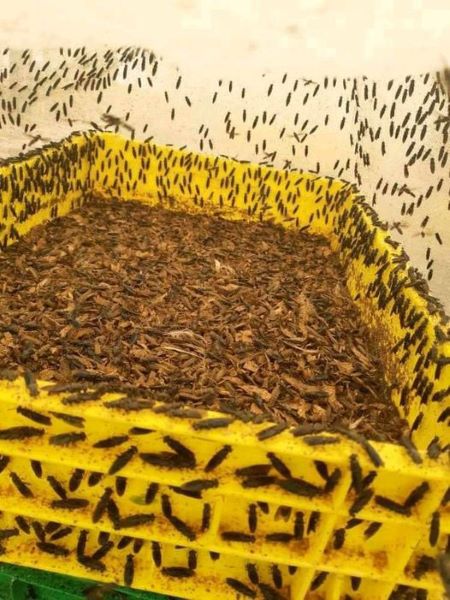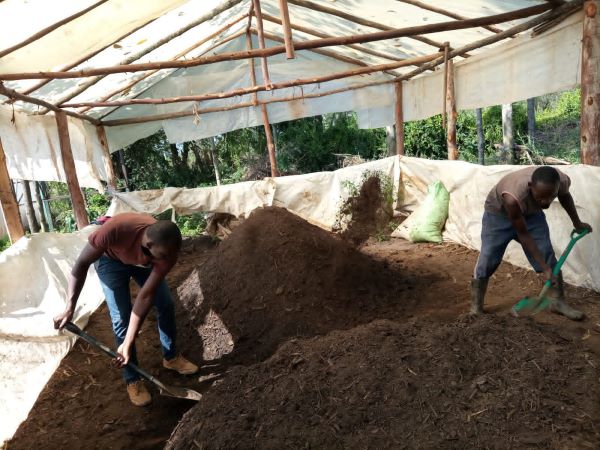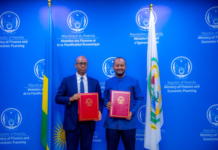Kenya is witnessing mushrooming insect farming startups offering solution to food and feed challenges and making income from the new farming frontier thanks to the International Center of Insect Physiology and Ecology (ICIPE), headquartered in Nairobi and the country’s ideal climate.
Currently, over 1,000 farmers in East Africa are engaged in insect rearing reinvigorated by the increasing market opportunities for the little creatures, according to Dr. Tanga Chrysantus, Head of ICIPE’s Insects for Food, Feed, and Other Uses (INSEFF) programme.
“So far, 75 per cent of the region’s millers are willing to fortify their feed with insects to reduce their costs while up to 95 per cent of fish and pig farmers are actively looking to bring down their production costs by incorporating insects into animal diets. In laying chicken, insect supplemented diets have shown to increase laying life by up to 62 per cent,” said Chrysantus.
Insect feed market trends
According to 2020-2025 Insect Feed Market – Growth, Trends, and Forecasts report, the global insect feed market was valued at $687.8 million in 2018 and is projected to grow by 11.7 per cent between 2022 and 2027.
In 2019, the market for edible insects exceeded $112 million globally and is estimated to grow at over 47 per cent CAGR between 2019 and 2026.
Increasing demand for high protein, low fat & economical food source along with shifting trends in dietary needs is likely to stimulate market outlook.
Sanergy Limited is one of the Kenyan startup that engages in the insect farming business. The company collects waste from Nairobi’s informal settlements which are converted to organic fertilisers and insect-based animal feed that has been found to increase crop yield and animal weight by 30 per cent.
Through its franchisee model, Sanergy saves over 126,690 urban slum dwellers by processing 43,473 tons of waste.
The organic waste is consumed by a colony of Black Soldier Flies (BSF) larvae which churn the waste into a nutrient-rich protein input for animal feed.
Frass, a residue from Black Soldier Fly production processes is mixed with carbon sources from plant waste to produce high-quality compost fertilizer.
Insecti Pro is another that farms half a billion crickets and BSF for human and animal consumption respectively.

Growing consumer demand
Despite generating up to three tons of feed daily the company can’t satisfy growing consumer demand.
A rich source of protein, zinc, and iron, the company is working with over 100 restaurants in the country to have crickets featured in their menus.
Additionally, Insecti Pro is working to combat malnutrition using crickets to feed over 500 children in HomaBay County.
Black soldier flies are used to produce animal feed especially targeted to commercial fish growers. Black soldier flies contain over 50 per cent protein making them a better option than soy. They are also far cheaper and purer than fishmeal.
Organic waste, the company’s main raw material is bulky to transport which has meant a need to develop workarounds to improve their logistics.
“We have set up four different hubs across the rural countryside that are close to our end consumers who’s often the farmer,” said Talash Huijbers, Insecti Pro founder.
Organic fertiliser
Nakuru-based Nawiri Organic Fertiliser also uses black soldier flies (BSF) to make nutritious compost fertiliser supplying to farmers in the Rift and Central regions of Kenya.
“We feed the BSF by organic wastes collected from other farms, market places and slaughter houses hence helping in reducing the greenhouse gas emissions like methane gas which is produced when the waste is rotten and that has a negative effect towards climate change,” said Robert Mwangi, founder of Nawiri Organic Fertiliser.
For tea and coffee farmers who need a nitrogen loaded fertilizer, he says, “I recommend a tailor-made type where I add to the decomposing manure water full of fish wastes from ponds to realise the important micro element besides boron and calcium which are equally produced.”
The fertiliser is packed in Nawiri branded 50 and 25kg sacks then sold to farmers.








